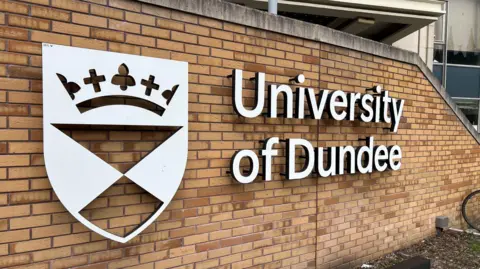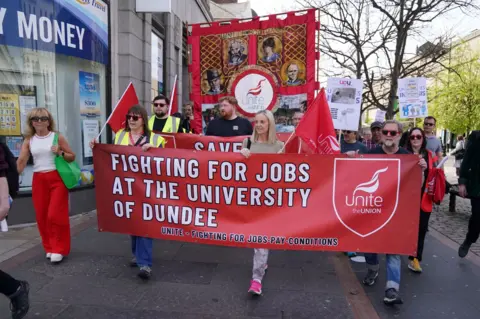Charity regulator to investigate crisis-hit university
 PA Media
PA MediaScotland's charity regulator has launched an investigation into the running of the crisis-hit University of Dundee.
The university's principal and two senior members of its governing body quit following a damning independent report into the institution's financial collapse and government bailout.
Investigators at the Office of the Scottish Charity Regulator (OSCR) will now probe the governance of the university, which is a registered charity, in recent years.
The university, which has apologised for its failings, plans to cut 300 jobs in a bid to address a £35m deficit.
The report by the Scottish Funding Council (SFC), the University of Dundee's main funder, found that university bosses and its governing body failed multiple times to identify a worsening crisis and continued to overspend instead of taking action.
It said the problems were "self-inflicted" and it should have been clear to senior members of the university that its financial position "was worse than presented".
The OSCR investigation will centre on the actions of these university bosses in their role as trustees of the charity.
OSCR has the power to ban individuals from being trustees of other charities in Scotland.
A statement issued by OSCR said the findings of the SFC's review "indicate that concerns remain about the governance" of the University of Dundee.
It added: "That's why we are now opening an inquiry into this charity, so that we can better understand these matters of concern.
"We look forward to working with the university and its trustees, past and present, to determine whether regulatory action is required."
The university is more than six weeks late in lodging its latest financial accounts with OSCR.
 University of Dundee
University of DundeeWhat went wrong at Dundee University?
The SFC report, led by Prof Pamela Gillies, found the main causes of the institution's deterioration included poor financial judgement from university bosses and weak governance from the university court, which is meant to hold senior management to account.
The report found that almost £40m of ringfenced money had been spent elsewhere and there had been "a lack of real action" to address an £8m "hole" due to a fall in international student recruitment.
It said those in charge of the university's governance should have known well before November last year that there was a problem.
There were numerous points where "a reasonable person" could have reached a judgement that the university's financial position was worse than presented, it said.
 PA Media
PA MediaThe current principal Prof Shane O'Neill and two senior members of the university's governing bodies resigned as soon as the SFC report was published.
Prof O'Neill took over as interim principal in December but he was previously deputy vice chancellor.
He was identified in the report along with former principal Prof Iain Gillespie, the chief operating officer and the director of finance as one of the university leaders who "did not cultivate a culture of openness and challenge at all levels".
Prof Gillespie, who resigned as the university's principal in December, was said to have had an "overbearing leadership style" and a dislike of potentially awkward confrontations or questioning.
The report said he frequently demonstrated hubris - or excessive pride - in his role, which it said can lead to a contempt towards people who offer criticism - and an obsession with personal image and status.
New interim leader appointed
The University of Dundee has now appointed Prof Nigel Seaton as its interim principal and vice-chancellor on a short-term basis.
Prof Seaton joined the university in May and previously ran Dundee's Abertay University.
He said: "The university faces considerable challenges in its recovery from a difficult financial position, and from what I know has been a very difficult period for staff.
"I am ready to work with my colleagues and with the university court to set the university on its way to a sustainable and successful future."
In response to the funding council report, Dr Ian Mair, deputy chair of the university court, said: "It is evident from the report that there have been clear failings in financial monitoring, management and governance.
"I understand that this has been an extremely stressful time for staff and students and I offer my sincere apologies for all of the anxiety and uncertainty this situation has caused.
Prof O'Neill said he was "truly sorry for the impact this financial crisis has had on many people, particularly our staff and students".
The BBC has tried to contact Prof Gillespie for his response to the report.
